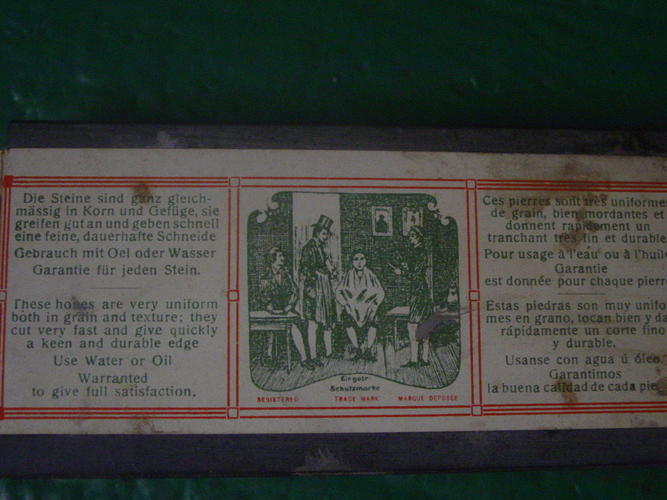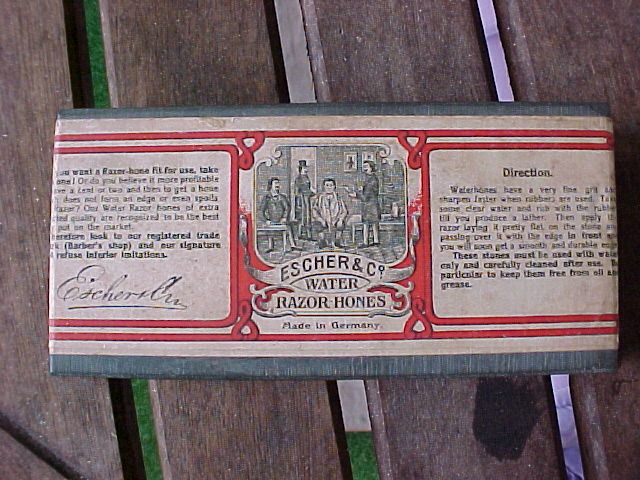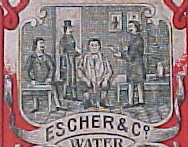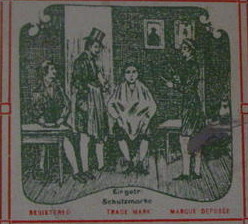Results 11 to 20 of 27
-
07-18-2017, 05:45 PM #11Senior Member

- Join Date
- Apr 2017
- Location
- Armonk, NY
- Posts
- 551
Thanked: 39
hopefully this is a better quality picture.

-
07-18-2017, 07:04 PM #12Senior Member




- Join Date
- Feb 2013
- Location
- Haida Gwaii, British Columbia, Canada
- Posts
- 14,455
Thanked: 4830
I have no idea what that hone is. I'm sure you could find out. There are a ton of homes out there that you can use with oil or water. Some hones like oils better, but with the increased surface tension the get slower.
It's not what you know, it's who you take fishing!
-
07-18-2017, 07:11 PM #13Senior Member


- Join Date
- Jul 2011
- Posts
- 2,110
Thanked: 459
Can you take a clear picture of the stone from the end (with the label side down) so that we can see what it looks like?
You have two dilemmas (well, not really a dilemma):
1) What is the stone, and is it worth anything? Presume the person in the picture is getting shaved, suggesting that it's some sort of thuri type stone (could be rebadged slate from somewhere else, though)
2) If it is a thuri stone, what would you do with it?
It's interesting to know that the label says that you can use it with oil. If you try it with water and it works well, and you never intend to use it with oil, then it's still just a curiosity.
In terms of Thuris, they are Slate, correct? There are a lot of English slates that can be used with water or oil, and some that are traditionally not (maybe because of what they were used for - WOA comes to mind, often used to polish silver).
Not advocating oiling up the stone in any case unless you really want to use it oiled and don't care whether or not that costs you some money down the road. If it turns out to be more coarse than the typical thuri, then....well, I'd still sell it instead (common knowledge, of course, that sometimes a stone that's a bit aggressive on water is a stone that will work just fine on oil).
-
07-18-2017, 07:38 PM #14

I don't know, but genuine Escher hone labels warn to beware of imitations and look for the Escher signature on the 'real' labels. That label looks similar to a genuine Escher, but I don't think it is identical, referring to the barber scene in the center of the label.

Last edited by JimmyHAD; 07-18-2017 at 07:42 PM.
Be careful how you treat people on your way up, you may meet them again on your way back down.
-
07-18-2017, 07:55 PM #15Senior Member

- Join Date
- Apr 2017
- Location
- Armonk, NY
- Posts
- 551
Thanked: 39
I definitely agree that the similarities are numerous. Strange that there is no maker's name whatsoever. It certainly could be one of the "imitations" the Escher labels refer to.
This isn't a hone I own or have seen in person. Its just one I came across that struck me as strange because of the label's look, the look of the hone itself, and the instructions regarding the use of oil.
-
07-19-2017, 12:50 AM #16

I don't know but I cropped the photos and here are close ups of the center piece of the labels for comparison.


Very similar, but not exactly the same position of characters and what not. Could be one of those 'bogus' stones Escher & Co warned about. I've never seen a bona fide Escher with a label recommending oil, but there is a lot I haven't seen. hatzicho or doorsch may be along, and they are very well versed on these. Perhaps they could confirm one way, or the other.Be careful how you treat people on your way up, you may meet them again on your way back down.
-
07-19-2017, 04:21 AM #17Senior Member

- Join Date
- Sep 2013
- Location
- NW Indiana
- Posts
- 1,060
Thanked: 246
I'd say that's a pretty blatant rip off of the Escher trademark, and exactly what they were warning about. Any pictures of the rest of the stone? Maybe it's not even a Thuri at all.
-
07-19-2017, 08:35 AM #18

I don't think this is a thuringia hone. Beside the well known barber scene, nothing reminds of a thuringian. The typical thuringian identifying word on labels is "water hone" or "waterwhetstone" or something similar and never oil was recomended for usage. A company simply covered the barber scene for their hones- whatever they are, if natural or man made. Also the hone was mainly produced for export as you see on four different languages. This was also typical for some thuringian wholeslaers that used the languages german, englich, french and spain - I believe, on their labels.
Summarizing I think the hone is not a thuringian, distributed somewhat maybe around or after WW2, covering several elements of the old -good selling- thuringian hones, maybe a natural or man made. With better pictures of the surface and the sides we may get a better idea.
-
The Following 2 Users Say Thank You to hatzicho For This Useful Post:
Marshal (07-19-2017), Toroblanco (07-28-2017)
-
07-19-2017, 01:03 PM #19Senior Member


- Join Date
- Jul 2011
- Posts
- 2,110
Thanked: 459
Warning of imitations was pretty common in the past, whether there were a lot of imitations or not.
"accept only genuine..."
"beware of imitations that don't measure up to the original..."
It's a free pat on the back. Hatzicho's thoughts about it being on the market after Escher was out of business would explain why it could be such a ripoff in a trade dress sense.
-
The Following User Says Thank You to DaveW For This Useful Post:
Toroblanco (07-28-2017)
-
07-19-2017, 02:48 PM #20
-
The Following User Says Thank You to Steve56 For This Useful Post:
Toroblanco (07-28-2017)


 20Likes
20Likes LinkBack URL
LinkBack URL About LinkBacks
About LinkBacks






 Reply With Quote
Reply With Quote

